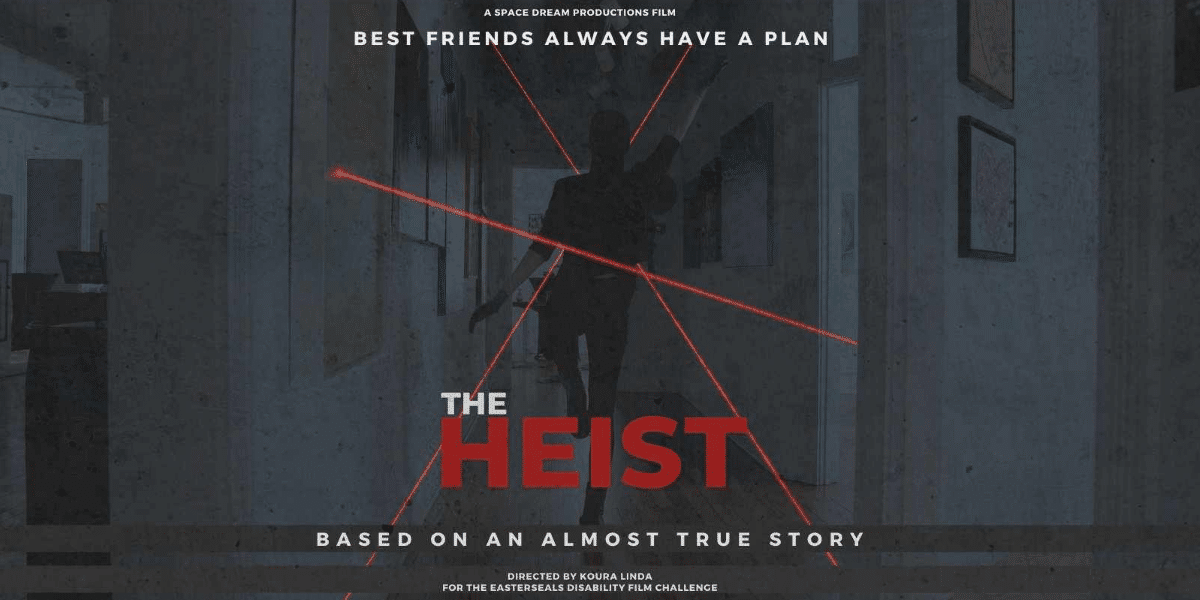In an era where diversity and inclusion are finally moving into the spotlight, one independent film company, Space Dream Productions, is taking significant strides toward reshaping the narrative of disability in the film industry. Spearheaded by a team of talented individuals with disabilities, this full-service production house is not only challenging conventional filmmaking norms but also championing accessibility and authentic representation on screen.
At the heart of Space Dream Productions’ mission is the belief that disability should not dictate capability. The mantra “Don’t assume what we can’t do – let us show you what we can do” encapsulates their ethos and serves as a guiding principle for their projects. Among these, “The Heist,” a five-minute short film created within the April 2nd – April 7th limited production window for the Easterseals Disability Film Challenge, stands out as a testament to their commitment to inclusivity and innovation.
Directed, produced, and co-written by Koura Linda, with Stevie Collins as co-writer and starring Koura Linda alongside Stevie Collins and Sarah M. Penn, “The Heist” offers more than just entertainment. The film tells the compelling story of Lilly, portrayed by Linda herself, who is crushed by overwhelmingly high medical bills. Her best friend, Star (played by Deaf actress Collins), concocts a daring plan to execute a heist worth millions to buy her way out. Joining them is Queenie (played by Penn), bringing an additional layer of depth to this dynamic trio.
What sets this plot apart is not merely its thrilling premise but also its authentic portrayal of disability: Star communicates through American Sign Language (ASL) and Simultaneous Communication (SimCom), while Queenie and Lilly both communicate with SimCom.
Adding another layer of authenticity is the inclusion of Daisy, Penn’s active medical alert service dog. This decision highlights Space Dream Productions’ understanding that representation goes beyond human characters; it encompasses all aspects of living with disabilities.
The representation of the characters came organically as Penn portrays Queenie on-screen with Daisy, and Lilly navigates life with mixed mobility levels, utilizing a wheelchair intermittently, as is true for Linda.
The authenticity extends beyond narrative elements; every above-the-line role in “The Heist” was filled by individuals living with disabilities. These deliberate casting and production choices ensure that the characters’ experiences are not only represented on screen but lived by those portraying them. The actors and key production crew bring genuine insight into their roles, bridging the gap between representation and reality.
Language plays a pivotal role in “The Heist,” seamlessly integrating ASL, SimCom, and spoken English throughout its duration. The script’s co-authorship by Collins—a Deaf writer—ensures accuracy in depicting some aspects Deaf culture while providing viewers with an immersive experience that educates as much as it entertains. Furthermore, Collins’ consultancy extends to ASL use on set and in editing processes, including open captions, underscoring Space Dream Productions’ dedication to accessibility at every production phase.
Unique design elements further distinguish “The Heist.” From custom-designed magazine spreads to security IDs and detailed hospital bills—all produced specifically for the film after the launch of the prompts on April 2nd—the meticulous attention to detail underscores Space Dream Productions’ commitment to crafting an immersive world within their films.
Linda’s husband and production partner, Spaceship, filled several creative roles as well, as the co-director of photography with Linda, providing the score and additional VFX and assisting with editing alongside Linda and Penn.
“The Heist” stands as more than just a short film; it represents a shift towards inclusivity in cinema, inspired by the driving mission of the Easterseals Disability Film Challenge. By placing disabled individuals both in front of and behind the camera—and infusing their narratives with realism—Space Dream Productions challenges societal perceptions about what people with disabilities can achieve while showcasing disabled talent and stories that go beyond a narrative strictly driven by “crip tales” (stories only about being disabled).
Through innovative storytelling techniques, genuine representation of disabled characters living full lives far beyond simplistic narratives around suffering or inspiration solely due to disability itself, and unyielding commitment to accessibility in all forms—both on-screen and off—Space Dream Productions exemplifies how independent cinema can lead change towards greater acceptance and understanding across all facets of society.
Standing testament to that, “The Heist” emerges not just as an engaging film but as a beacon for future filmmakers aspiring towards inclusivity without compromise.
Space Dream Productions maintains an active presence across various social media platforms—including Instagram (@SpaceDreamProductions), Facebook (@SpaceDreamProductions), TikTok (@SpaceDreamProductions), and LinkedIn (@SpaceDreamProductions)—and invites audiences worldwide to engage with their work online via www.spacedreamproductions.com. Through these channels, they share behind-the-scenes glimpses into their creative process and highlight how they’re breaking new ground in film production.
Watch “The Heist” here.
Published by: Martin De Juan






